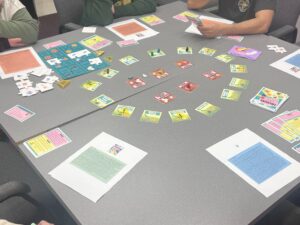The collaborative board game is a research-based training tool that is being used as part of a 75minute to 2.5 hour training session to bring about conversation, ideally leading to attitude and behavioral change. The game can be used in UMBC classes (and throughout other communities) to increase empathy and understanding around working with immigrants in the hopes of creating a more inclusive and knowledgeable society.
The learning objectives for the training include:
- Understand the varied experiences of different types of immigrants in their country of origin
- Learn about varied immigrant student experiences and human rights violations faced in US schools
- Appreciate the resilience and strengths that immigrants bring to our communities
- Feel emotions such as disappointment, excitement, stress, and relief as a way to help build empathy for the immigrant experience as a result of the above objectives
- Explore support systems available to immigrant students, US-born students of immigrant parents, and immigrant caregivers/family members (and teachers/families) in local schools and communities
- Consider the multitude of different ways that immigrants experience success in the US
- Highlight the importance of collaboration and networking- between school staff members, community members, parents, and local nonprofits- to ensure the success of their immigrant and ESOL students
- Discuss possible action steps within your personal life, your work, and/or collaborative advocacy and opportunities for change
- Have fun, while learning
As illustrated in the game, many of the struggles immigrants face, and many of the community resources discussed can be relevant in settings outside of the educational ecosystem. Therefore, Dr. Evans feels that attending this training can be beneficial to UMBC students regardless of their major. UMBC students are the future, and they can be agents of change in their personal and professional lives as they promote inclusivity for immigrants in our communities.
The training is also appropriate for professionals. This could include faculty and staff at UMBC, local nonprofits, schools, and companies. If we go back to the overarching goals of building empathy for immigrants and advocating for a better and more inclusive future, the training is for all of us.
The training is ideal for groups of 8 to 60 people and can be adapted to your specific group or class, as we are happy to help make connections to class content and shared interests of a group. For example, we’ve done the training in UMBC classes for social workers, educators, and public health to name a few. We’ve also visited Alternative Spring Break groups, and hosted in one the Mosaic Center. Please reach out today to schedule a session at kerrieva@umbc.edu
